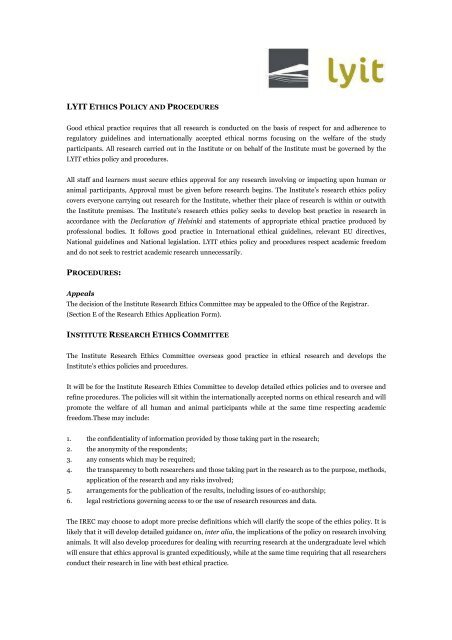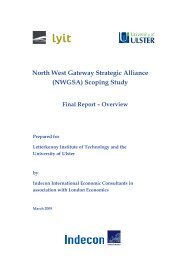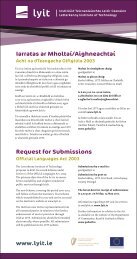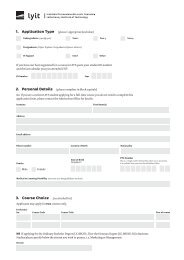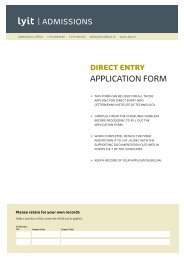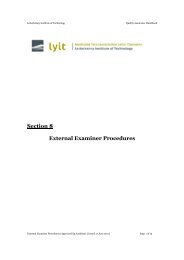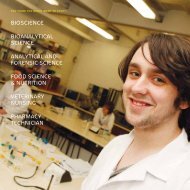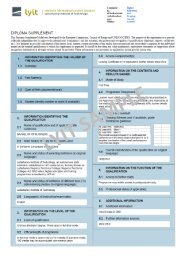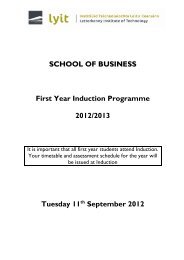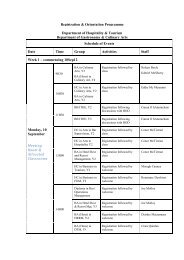Research Ethics Policy and Procedures
Research Ethics Policy and Procedures
Research Ethics Policy and Procedures
You also want an ePaper? Increase the reach of your titles
YUMPU automatically turns print PDFs into web optimized ePapers that Google loves.
LYIT ETHICS POLICY AND PROCEDURES<br />
Good ethical practice requires that all research is conducted on the basis of respect for <strong>and</strong> adherence to<br />
regulatory guidelines <strong>and</strong> internationally accepted ethical norms focusing on the welfare of the study<br />
participants. All research carried out in the Institute or on behalf of the Institute must be governed by the<br />
LYIT ethics policy <strong>and</strong> procedures.<br />
All staff <strong>and</strong> learners must secure ethics approval for any research involving or impacting upon human or<br />
animal participants, Approval must be given before research begins. The Institute’s research ethics policy<br />
covers everyone carrying out research for the Institute, whether their place of research is within or outwith<br />
the Institute premises. The Institute’s research ethics policy seeks to develop best practice in research in<br />
accordance with the Declaration of Helsinki <strong>and</strong> statements of appropriate ethical practice produced by<br />
professional bodies. It follows good practice in International ethical guidelines, relevant EU directives,<br />
National guidelines <strong>and</strong> National legislation. LYIT ethics policy <strong>and</strong> procedures respect academic freedom<br />
<strong>and</strong> do not seek to restrict academic research unnecessarily.<br />
PROCEDURES:<br />
Appeals<br />
The decision of the Institute <strong>Research</strong> <strong>Ethics</strong> Committee may be appealed to the Office of the Registrar.<br />
(Section E of the <strong>Research</strong> <strong>Ethics</strong> Application Form).<br />
INSTITUTE RESEARCH ETHICS COMMITTEE<br />
The Institute <strong>Research</strong> <strong>Ethics</strong> Committee overseas good practice in ethical research <strong>and</strong> develops the<br />
Institute’s ethics policies <strong>and</strong> procedures.<br />
It will be for the Institute <strong>Research</strong> <strong>Ethics</strong> Committee to develop detailed ethics policies <strong>and</strong> to oversee <strong>and</strong><br />
refine procedures. The policies will sit within the internationally accepted norms on ethical research <strong>and</strong> will<br />
promote the welfare of all human <strong>and</strong> animal participants while at the same time respecting academic<br />
freedom.These may include:<br />
1. the confidentiality of information provided by those taking part in the research;<br />
2. the anonymity of the respondents;<br />
3. any consents which may be required;<br />
4. the transparency to both researchers <strong>and</strong> those taking part in the research as to the purpose, methods,<br />
application of the research <strong>and</strong> any risks involved;<br />
5. arrangements for the publication of the results, including issues of co-authorship;<br />
6. legal restrictions governing access to or the use of research resources <strong>and</strong> data.<br />
The IREC may choose to adopt more precise definitions which will clarify the scope of the ethics policy. It is<br />
likely that it will develop detailed guidance on, inter alia, the implications of the policy on research involving<br />
animals. It will also develop procedures for dealing with recurring research at the undergraduate level which<br />
will ensure that ethics approval is granted expeditiously, while at the same time requiring that all researchers<br />
conduct their research in line with best ethical practice.
REGULATIONS/ DIRECTIVES GOVERNING ETHICAL CONDUCT OF RESEARCH<br />
• Declaration of Helsinki<br />
• EU Directive 2001/20EC on Clinical Trials<br />
POLICY AND GUIDANCE DOCUMENTS ON ETHICAL ISSUES RELATED TO RESEARCH<br />
• Consent in <strong>Research</strong> - National Federation of Voluntary Bodies - Providing Services to People with<br />
Intellectual Disability<br />
• The Data Protection Acts 1988 <strong>and</strong> 2003 - Some implications for public health <strong>and</strong> medical research -<br />
Health <strong>Research</strong> Board<br />
• Human Biological Material: Recommendations for Collection, Use <strong>and</strong> Storage in <strong>Research</strong> 2005 -<br />
Irish Council for Bioethics<br />
• The Medical <strong>and</strong> Health Sector - Data Protection Rules in Practice - Data Protection Commissioner<br />
• Personal Information in Medical <strong>Research</strong> - UK's Medical <strong>Research</strong> Council<br />
• Operational <strong>Procedures</strong> for <strong>Research</strong> <strong>Ethics</strong> Committees: Guidance 2004 - Irish Council for Bioethics<br />
Guideline document<br />
• Human <strong>Ethics</strong> H<strong>and</strong>book - Commentary on the Australian National Statement on ethical conduct of<br />
research involving humans<br />
• Genetically modified crops: the ethical <strong>and</strong> social issues - Publication by Nuffield Council on Bioethics<br />
• Organs retained at Autopsy: Ethical <strong>and</strong> practical issues - Advice of the Australian Health <strong>Ethics</strong><br />
Committee<br />
• Embrios, scientific research <strong>and</strong> European legislation -DG <strong>Research</strong> Briefing Note No. 14/2001<br />
• Animal to human transplants; the ethics of Xenotransplantation - Publication by Nuffield Council on<br />
Bioethics<br />
COMPOSITION<br />
The composition of the Institute <strong>Research</strong> <strong>Ethics</strong> Committee will be as follows:<br />
1. Member of Executive Board (Chair);<br />
2. Independent<br />
3. Chair of Academic Council <strong>Research</strong> Committee;<br />
4. President of the Student’ Union<br />
5. Two members of research active members of academic staff.<br />
6. The four LYIT Heads of School<br />
The quorum for the Committee will be six.<br />
The Committee will normally reach decision by consensus. If consensus cannot be obtained then the<br />
majority decision will apply with the Chair having the casting vote.<br />
INDEPENDENT MEMBERSHIP OF IREC<br />
Governing Body will approve independent members who may be called upon to sit on the IREC. The panel<br />
list will be valid for three years.
Dates of meetings<br />
The Committee will hold one meeting each semester. Dates will be published on the website.<br />
All papers must be submitted to the committee at least one week in advance of the meeting dates. Late<br />
submissions will not be considered until the subsequent meeting.<br />
Remit<br />
Having considered all the material submitted the IREC may:<br />
<br />
<br />
<br />
<br />
grant ethical approval <strong>and</strong> authorise the research to proceed without requiring any amendment.<br />
Any such authorisation is granted on the basis of the project as stated on the research submission;<br />
any changes must be notified to (<strong>and</strong> approved by) the Committee.<br />
seek additional information, if necessary through a formal meeting of the Committee with the<br />
researcher (though this will be the exception rather than the rule).<br />
ask for modifications <strong>and</strong> a resubmission of the application.<br />
withhold approval until all conditions set by the Committee have been met <strong>and</strong> all<br />
recommendations set by the Committee have been addressed.<br />
In all instances the Committee will give reasons in writing for its decision.
Application Form for <strong>Ethics</strong> Approval submitted to the School <strong>Ethics</strong> Committee<br />
IREC reviews Application<br />
Seeks<br />
Modifications<br />
<strong>Ethics</strong> Approval<br />
Granted<br />
/clearance not<br />
required<br />
Reject<br />
Appeal to<br />
Office of<br />
Registrar<br />
Proceed with any one of the following:<br />
• Funding application<br />
• Application for admission to<br />
research degree programme<br />
• Begin research project


